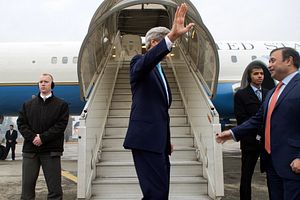Last month, the Obama administration announced that it had approved the sale of up to eight F-16 fighter jets to Pakistan in a deal valued at $699 million. Immediately the decision led to a strong pushback in the U.S. Congress. The chairman of the Senate Foreign Relations Committee, Sen. Bob Corker, raised serious concerns, stating, “They (Pakistan) continue to support the Taliban, the Haqqani network, and give safe haven to al Qaeda.”
Sen. John McCain, chairman of the U.S. Senate’s influential Armed Services committee, called for a hearing in the Senate’s Foreign Relations committee to further question the timing of the United States’ sale of fighter jets to Pakistan and suggested that he “would rather have seen it kicked over into the next administration.” His colleague from Kentucky, Sen. Rand Paul, separately called for a resolution that would block U.S. arms sales to Pakistan.
Members of Congress have 30 days to block the deal before it becomes official, but the Obama administration has strongly defended its decision. David McKeeby, a spokesman for the U.S. State Department – the agency responsible for conducting the deal – said, “Pakistan’s current F-16s have proven critical to the success of these operations to date. These operations reduce the ability of militants to use Pakistani territory as a safe haven for terrorism and a base of support for the insurgency in Afghanistan.” Secretary of State John Kerry himself has been at the forefront of this defense, suggesting that the Pakistani military “has been deeply engaged in the fight against terrorism.”
India’s reaction to the sale was strong. It disagreed with the U.S. stand that this sale would help in the fight against terrorism and instead has argued that it would be used against India. The U.S. ambassador to India was summoned to underscore India’s displeasure. New Delhi is seriously concerned about the changing balance of air power in the region as Pakistan today has four squadrons of F-16 fighters, all built with U.S. assistance. The anti-U.S. sentiment of Indian elites once again came to the fore with suggestions in sections of the media that the United States cannot be trusted.
New Delhi has some genuine concerns about U.S. military assistance to Pakistan. Such support has traditionally strengthened the military at the expense of the civilian government in Islamabad, with which India is trying to have a stable peace dialogue. Pakistan is yet to show that it is taking credible action against groups like the Haqqani network and Lashkar-e-Taiba. Groups targeting India and Afghanistan continue to be seen as essential in Pakistani foreign policy matrix. And historically, Washington has more often than not been wrong about its ability to shape Pakistani domestic and foreign policy positively with its military assistance. Just since 2002, the U.S. has provided $30 billion worth of aid and assistance to Pakistan. Despite this, the United States remains hugely unpopular in Pakistan and its policy of relying on Pakistan in Afghanistan has been a failure.
Clearly Washington has its own priorities insofar as its relations with Pakistan are concerned, especially in using Pakistan’s leverage in the on-going attempts at resuming peace talks with the Taliban. Obama’s Afghanistan policy has faced a lot criticism, particularly for his seeming haste in announcing the withdrawal of U.S. troops from the country. Now, he has one last chance to seek a resolution in Afghanistan and Pakistan is viewed as critical to managing any political transition in Afghanistan. But Washington would do well to also take into account Indian interests. Where the Bush administration managed to effectively de-hyphenate India and Pakistan, the Obama administration has not been that sensitive to Indian views on regional issues. As it sends new fighters to Pakistan, Washington needs to be more emphatic in demanding that Pakistan cease exporting terror from its soil.
India should also be more confident of its own ability to shape the future trajectory of Indo-U.S. ties. After all, Lockheed Martin, the builder of the F-16, recently offered to move its production line to India from the United States to support the Modi government’s “Make in India” program. Today India is a global player in true sense of the term while Pakistan is just about managing to survive as a cohesive unit. Indian elites too need to de-hyphenate New Delhi from Islamabad in their own minds. Any overture that Washington makes toward Pakistan is immediately pounced upon as a sign of American duplicity. The reality is that Washington’s ties with New Delhi are truly strategic while its relationship with Pakistan is at best transactional, whatever gloss the two sides might want to put on it. India and the United States are today talking of jointly working on aircraft carriers, discussing joint patrols in the South China Sea, and are nearing completion on an agreement to share military logistics.
As New Delhi and Washington chart an ambitious trajectory in their bilateral ties, they need to find a more effective way of dealing with Pakistan. The Pakistan factor cannot be allowed to derail the positive momentum in this very important bilateral relationship, one that will be key in shaping the larger Indo-Pacific balance of the power in the coming years.

































